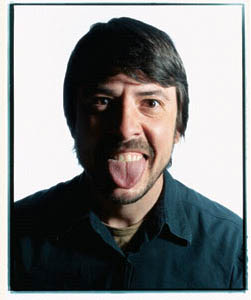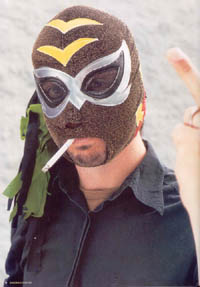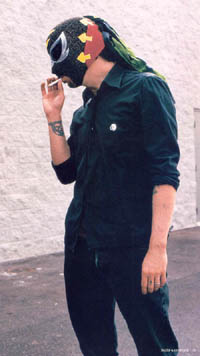Street Fighting Man

Dazed & Confused 2005
At 36, Dave Grohl is already a bonafide rock 'n' roll legend. But the former Nirvana drummer turned Foo Fighters frontman, is not just a walking relic of music history. With a stunning new double album and a string of huge UK shows on the slate, Dave is as vital and relevant as he's ever been.
 There is something achingly familiar about Dave Grohl. Something reminiscent of that kid with the tattered Black Sabbath shirt who lived down the block; the guy with the drum set in his garage; the shaggy- haired boy who smoked joints behind the gas station, stole from the family liquor cabinet and introduced the neighbourhood to Led Zeppelin by playing "Rain Song" at full volume during a late-night, mid-summer, mushroom trip.
There is something achingly familiar about Dave Grohl. Something reminiscent of that kid with the tattered Black Sabbath shirt who lived down the block; the guy with the drum set in his garage; the shaggy- haired boy who smoked joints behind the gas station, stole from the family liquor cabinet and introduced the neighbourhood to Led Zeppelin by playing "Rain Song" at full volume during a late-night, mid-summer, mushroom trip.
Talking to him, if you happen to be another veteran of the East Coast, American suburbs, is a nostalgic experience. Dave Grohl is the boy
I had a crush on in maths class, the cute guy who worked at the roller rink, the kid who kissed me at the Ted Nugent concert - a long wet kiss that smelled of soap and sweat and cigarettes.
Now 36 years old, Grohl possesses an air of eternal adolescence an energetic, enthusiastic sort of innocence that he's managed to maintain through several world tours, two incredibly successful rock bands, various acts of self-abuse, and the tragic death of a good friend. He looks younger than his age, with sinewy, tattooed arms, a close-cropped beard, and mischievous brown eyes that continually flicker and shine.
For the moment, Grohl is holed up in his new 8,000 square foot studio hidden away in the urban wasteland of the San Fernando Valley. The space is part clubhouse, part basement rec room, filled with toys and guitars, and a few strategically placed lava lamps. There's a marble skull on the mixing board and a giant leather couch strewn with pillows his mum made from old concert t-shirts.
 " I got that one when I was 13," says Grohl, pointing to a cushion rendered from an early 80s Genesis shirt. "I worked that concert. Actually, what I was really doing was spending the whole day looking for pot." Grohl chuckles. "All my adolescent stories start with, I was looking for pot. 'I was looking for pot and I ended up working at the Genesis concert...' 'I was looking for pot at this kid's house and he had the new Iron Maiden album...' That phrase pretty much sums up my entire teenage experience."
" I got that one when I was 13," says Grohl, pointing to a cushion rendered from an early 80s Genesis shirt. "I worked that concert. Actually, what I was really doing was spending the whole day looking for pot." Grohl chuckles. "All my adolescent stories start with, I was looking for pot. 'I was looking for pot and I ended up working at the Genesis concert...' 'I was looking for pot at this kid's house and he had the new Iron Maiden album...' That phrase pretty much sums up my entire teenage experience."
Raised in Virginia, just outside Washington DC, Grohl's mum worked to make ends meet while he spent his time playing drums and going to stadium concerts and local punk rock shows, immersing himself in everything from Black Flag to Motorhead. By 18, he was touring the coast with various bands and by his early 20s he was enlisted to play with Nirvana - a gig that would earn him fame, fortune and eventually, with the suicide of band mate Kurt Cobain, force him to face a sad reality.
With the demise of Nirvana, Grohl moped around his home in Seattle, hiding out in his room and recording his own songs on the sly, committing music to a four track and experimenting with lyrics, but completely uncertain about what step to take next.
"The Foo Fighters weren't supposed to be a band," says Grohl thoughtfully, lighting a cigarette, and taking a long, satisfying drag. "It was just a demo tape. After Nirvana ended, I was asked by a lot of bands like Danzig and Tom Petty, to join as a drummer. I was actually really into it and almost did the Tom Petty thing. When he asked me to join, I thought, 'Oh my god, it's Tom Petty!' But I'd just finished recording this thing by myself, these songs that I had written, and I thought, 'It's one or the other, do I do something I've never done before, or do I do something I feel confident about?' And I figured it was better to do something that scared the shit out of me, because it would be more exciting."
The result of that decision long ago was- the first Foo Fighters album, recorded in just five days and released on Grohl's own label, Roswell Records. In the ten years that have followed the band has 1
continued to make music their own way, working as autonomously as possible, away from the major label machine.
By the second album, Grohl had relocated to LA, and spent a year "fucking everybody and partying the whole time". Eventually the insanity of California made him return to Virginia, where he bought a house in his old neighbourhood and installed a studio in the basement.
"I bought an old mixing board, some compressors and some mics
and started making our records there," he remembers. "We made our
third record by ourselves in that basement. We've always tried to have
a kind of shield that guards our independence, so we don't have to do things in a conventional way. We don't have to load into some beautiful commercial Hollywood studio, for instance, and sit and watch the clock tick while we're trying to make a record."
 By the time their third album, There is Nothing Left to Lose, was released, the Foo Fighters were topping charts and touring the world to sell-out crowds. The music they had made on their own terms ended up hitting a sweet spot in the cultural clime and for the second time in his
life, Grohl found himself in one of the most popular bands on the planet.
By the time their third album, There is Nothing Left to Lose, was released, the Foo Fighters were topping charts and touring the world to sell-out crowds. The music they had made on their own terms ended up hitting a sweet spot in the cultural clime and for the second time in his
life, Grohl found himself in one of the most popular bands on the planet.
"I am the first one to admit," he says, shaking his head, "that I'm the i luckiest bastard ever."
Last year, as several members of the band began to gravitate back to California, Grohl followed, leaving Virginia for good, buying a house and purchasing an enormous industrial warehouse space to serve as the Foo Fighters headquarters. "It made sense to centralise, to find a place where we could record, have our offices, store our gear."
Grohl opens his arms with a proprietary air, his motion taking in the massive space that he and his friends have managed to completely transform over the past 12 months. "This has really become the honeycomb hideout for the band," he explains. "It's a nice, relaxed atmosphere. Once you walk outside the studio, the circus begins. But
when you're in here it's just a bunch of friends and family hanging out. and you get to make records the way you really want to."
Bought in April 2004, Grohl started building the studio in August. "We hit recording the first week of November," he says, beaming. "It was fucking fast. Not only did we decide to build a studio, we decided to make a double record - one that was totally different from anything we'd ever done. So I'm more proud of what we've just done than anything else I've ever done in my life. It's insane. The magnitude and the fucking intensity of it all. The last year spent stuffing insulation into bass traps and trying to come up with a decent chorus and making sure we have the zoning permit. 'Do we have enough parking spaces in the lot?' 'I don't like that snare sound.' 'I have to change the lyric in the last line of the second chorus.' Everyday has been like that and you know what, I'd rather be here than any other place in the whole fucking world."
With that, Grohl hits a button and the first track from the new album bursts forth from a wall of speakers. It's titled "In Your Honor" - a raging, turbulent wave of noise, intro'd by a shrieking sweep of guitars that quickly becomes louder and grander - a true blues rock anthem, with old school swagger and meaty, unapologetic production. Next up is the album's single, "Best of You", a tidy, charming tune, complete with trademark Foo Fighters breakdown and an utterly contagious chorus. Grohl listens intently, nodding his head enthusiastically as if he'd never heard the tracks before. He is pleased with himself, with the band; with the new world they've built for themselves. And there's a very good chance their fans will be pleased as well.
"I don't know if it's because I'm getting older, or if I'm just becoming a fucking snob," Grohl says suddenly, stamping out his cigarette, "but I'm so disappointed with what people are being fed musically these days. It's junk food, it's so bad. And bands that people rely on are starting to fail. I wish every band could do what we're allowed to do, because we're allowed to simply be ourselves."
With several hit albums behind them, the Foo Fighters have now managed to make their most innovative work to date - a double record that alternates between roaring rock'n'roll numbers and delicate acoustic experiments. They've also enlisted an impressive !ist of co-stars, with Norah Jones and Led Zeppelin's John Paul Jones contributing to the project. "We have this opportunity to try to open people up," says Grohl happily, "with an acoustic track or a bossa nova song with Norah Jones alongside a balls to the wall rock number. I don't know what's going to happen, but I'd rather have it as it is, rather than some FM radio bullshit."
In short, Grohl's band are attempting to save good old fashioned rock'n'roll, with a taut and unstoppable sound, the kind of music his youth was made of. The kind of music that makes you think of torn blue jeans, pot smoke and the flicker of lighters held aloft in a darkened stadium. "Basically," says Grohl firmly, "I feel that as a musician you have a responsibility to kids, to music and to culture. I mean, I'm no Svengali, I'm not John Lennon, but I feel like everyone has to push themselves a little bit, in order for things to proceed. The way we figure it, it's definitely not the time to play it safe."
Words: Jessica Hundley Pics: Rankin
back to the features index

 There is something achingly familiar about Dave Grohl. Something reminiscent of that kid with the tattered Black Sabbath shirt who lived down the block; the guy with the drum set in his garage; the shaggy- haired boy who smoked joints behind the gas station, stole from the family liquor cabinet and introduced the neighbourhood to Led Zeppelin by playing "Rain Song" at full volume during a late-night, mid-summer, mushroom trip.
There is something achingly familiar about Dave Grohl. Something reminiscent of that kid with the tattered Black Sabbath shirt who lived down the block; the guy with the drum set in his garage; the shaggy- haired boy who smoked joints behind the gas station, stole from the family liquor cabinet and introduced the neighbourhood to Led Zeppelin by playing "Rain Song" at full volume during a late-night, mid-summer, mushroom trip. " I got that one when I was 13," says Grohl, pointing to a cushion rendered from an early 80s Genesis shirt. "I worked that concert. Actually, what I was really doing was spending the whole day looking for pot." Grohl chuckles. "All my adolescent stories start with, I was looking for pot. 'I was looking for pot and I ended up working at the Genesis concert...' 'I was looking for pot at this kid's house and he had the new Iron Maiden album...' That phrase pretty much sums up my entire teenage experience."
" I got that one when I was 13," says Grohl, pointing to a cushion rendered from an early 80s Genesis shirt. "I worked that concert. Actually, what I was really doing was spending the whole day looking for pot." Grohl chuckles. "All my adolescent stories start with, I was looking for pot. 'I was looking for pot and I ended up working at the Genesis concert...' 'I was looking for pot at this kid's house and he had the new Iron Maiden album...' That phrase pretty much sums up my entire teenage experience." By the time their third album, There is Nothing Left to Lose, was released, the Foo Fighters were topping charts and touring the world to sell-out crowds. The music they had made on their own terms ended up hitting a sweet spot in the cultural clime and for the second time in his
life, Grohl found himself in one of the most popular bands on the planet.
By the time their third album, There is Nothing Left to Lose, was released, the Foo Fighters were topping charts and touring the world to sell-out crowds. The music they had made on their own terms ended up hitting a sweet spot in the cultural clime and for the second time in his
life, Grohl found himself in one of the most popular bands on the planet.